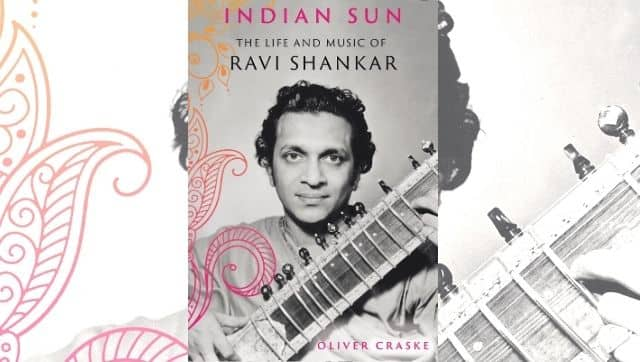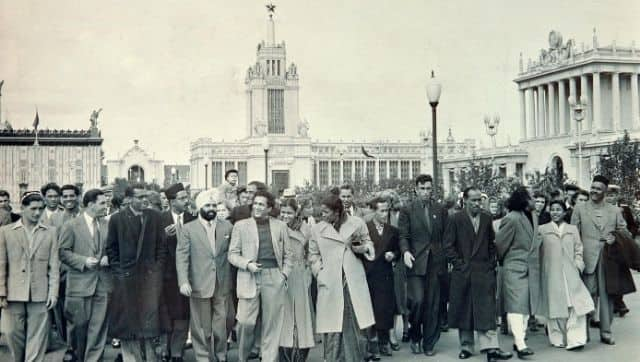Oliver Craske’s Indian Sun: The Life and Music of Ravi Shankar is the sitar maestro’s first biography. It is a detailed portrait of the extraordinary artist, tracing his rise to stardom. Through over 130 interviews with those who peopled his life, as well as great access to the Shankar family, Craske talks about the musician’s childhood traumas, his popularity as a dancer and his instrumental contribution to the revival of Indian classical music in the country and across the world. In the excerpt that follows, Craske writes about Shankar’s renown as an international artist who took Indian classical music to the world stage and the struggle, effort and showmanship that cemented his popularity. ** It is crucial to retain the Indian perspective. One result of Ravi Shankar’s success as a global pioneer, which dominates his reputation, is that his impact in his homeland is often forgotten. The name Ravi means the sun, and in 1997 the Times of India acclaimed him as ‘The Sun who Rose in the West’, but the newspaper had a short memory. Before he began touring abroad as a sitar-player, his standing was already unrivalled in India. He was prolific, fiercely creative and a superb communicator. As the country shrugged off its colonial shackles, he told Indians to be proud of their cultural riches. Through his record releases, concerts, film scores and theatrical productions, and especially through radio, which had blossomed late in India, he led the way in creating, for the first time, a mass market inside India for the nation’s classical music. In the generation of great musicians that emerged after India’s independence, he was first among equals. He was the only classical musician to have a film star’s profile. Yet in India Ravi seemed to be deified and vilified in almost equal measure. He was accused of straying from musical purity and marital fidelity. Long before any rock stars had even picked up a sitar, he had been condemned for allegedly Westernising his music, so when he became an idol to the hippies his detractors went into overdrive. Meanwhile, gossip circulated in India about his stormy first marriage to his guru’s daughter and his many later love affairs. Although he could be thin-skinned about any criticism, the attacks on his morality did not bother him as much as those on his art. He was hypersensitive to the charge that he was polluting Indian music, because on his foreign travels he was in fact obsessed with asserting its dignity and integrity. In his own words, ‘What everyone thinks is that Ravi Shankar has got a lot of roses but they do not know that he was showered with an equal number of thorns.’ [caption id=“attachment_8677871” align=“alignnone” width=“640”]  Oliver Craske’s Indian Sun: The Life and Music of Ravi Shankar[/caption] It is perhaps a consequence of these attacks that, while his fame remains unrivalled among Indian classical musicians, he is sometimes underestimated as an artist. There are listeners who, on hearing music that is so seductive and impeccable, that is presented so engagingly, and that had such a colossal mainstream appeal, conclude that there must have been something insubstantial about the musician. Surely he must have sold out? We often think of the serious artist as one who is difficult or contrary, who struggles in anonymity. Ravi Shankar does not fit this description: he was a charismatic extrovert who earned and loved the limelight, a polished performer who brought a new professionalism to Indian music. There was something irresistible about him, as millions of fans (and dozens of lovers) would attest. A perception grew, especially in India, that, compared with some contemporaries – especially his brilliant fellow sitar-player and frequent antagonist, Vilayat Khan – he was more lightweight, too showbiz. Others, especially abroad, consider him to be one of the twentieth century’s most significant musicians – probably India’s most important cultural figure of the era, and certainly its most enduring. After all, he charted the map for thousands of global musicians who travelled the world in his wake. Yehudi Menuhin, Ravi’s first great champion in the West, declared that he was indebted to him ‘for some of the most inspiring moments I have ever lived in music’. Zubin Mehta has called him the Jascha Heifetz of India. Philip Glass, who considers him to be one of his two principal teachers, said of him in 2006, ‘It is easy to fall into the habit of thinking of the great masters of music as beings who existed in some distant time – a hoary past celebrating its bi- or tercentennials. Yet one of those masters is here among us now.’ This sophisticated showman in fact worked incredibly hard to make what he did look so effortless. Amit Chaudhuri, the writer and musician, who composed the libretto for Ravi’s final work, his opera Sukanya, judges that he was ‘incomparably skilled, and his facility often made what he played seem easy.’ It was a style of playing that Ravi cultivated in his disciples; he would admonish them if they let the hard work show. His life often resembled the music: swan-like serenity on the surface, but furious paddling underneath, with all kinds of turbulence rippling around him. At the sixteenth-century court of Emperor Akbar in Agra, there was a musician called Mian Tansen, of whom it was said that he had yogic control of sound. He could make it rain by singing Raga Megh Malhar; he could light oil lamps by singing Raga Deepak. He became the most hallowed name in the entire history of north Indian music. Yet he embodied the spirit of vinaya, or humility, in his approach to learning music. ‘My knowledge is like a drop in a vast ocean of promise,’ he told Akbar. [caption id=“attachment_8677881” align=“alignnone” width=“640”]  Ravi Shankar in Moscow in 1954 as part of the Indian Cultural Delegation. Image courtesy: Shankar family[/caption] For Ravi Shankar, too, the learning never ended. He strove ceaselessly to improve, to discover new riches of musical experience. How driven he must have been to maintain such a hectic schedule for so many decades: all those ragas, talas, bandishes and bhajans, film scores, albums, musicals and songs. Concertos and a symphony, too; even that opera, which he was still composing in hospital when he was ninety-two. And in between, the perpetual motion of touring. Once, when asked why he made music, he joked, ‘There’s an insect gnawing in my head.’ There was some truth hidden in his jest. He had no choice; it was as if there was always something else impelling him on his unlikely and often lonely mission. ‘I feel God mostly in the musical notes,’ he once said. For a man who so often exuded joy and frivolity, there was something very serious at his heart. Music, he discovered, could evoke serenity, bliss or melancholy; it could heal; it could even transcend life and death. He often talked of the ‘beautiful sadness’ that he felt in the search for musical and spiritual perfection. He lived a life of passion and pain, and of enormous artistic and material success, but above all of constant quest – musical, emotional and spiritual. ‘For me there is always that sadness in a raga,’ he once said, ‘that wanting to reach something that I know beforehand I never will, and each note is like crying out, searching.’ The above extract from Oliver Craske’s Indian Sun: The Life and Music of Ravi Shankar has been reproduced here with permission from Penguin Random House.
We often think of the serious artist as one who is difficult or contrary, who struggles in anonymity. Ravi Shankar does not fit this description.
Advertisement
End of Article


)
)
)
)
)
)
)
)
)



